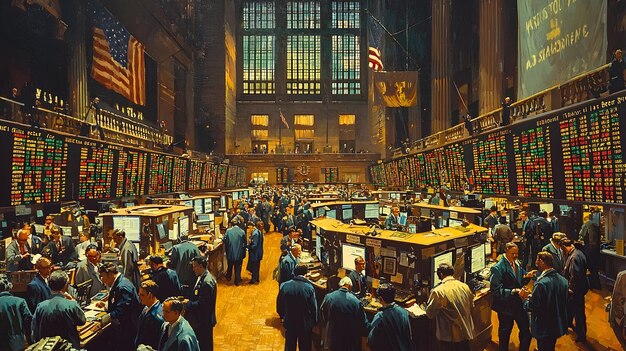The Stock Market’s Reaction to the Upcoming Election: What Investors Need to Know
As the upcoming election approaches, investors are understandably concerned about how the market might react to the potential outcomes. The stock market has historically shown sensitivity to political changes and economic policies. Here’s what investors need to know:
Market Volatility is Likely
The days leading up to the election and the days following it are expected to be volatile. The uncertainty surrounding the outcome can cause increased volatility, leading to significant price swings. It’s crucial for investors to have a well-diversified portfolio and not make hasty decisions based on short-term market movements.
Economic Policies Matter
Taxes, regulations, and trade policies
are some of the major economic areas that can be influenced by the election outcome. Changes to these policies can have a significant impact on specific sectors and industries, making it essential for investors to stay informed about the candidates’ positions on these issues.
Pre-Election Season: Buy or Sell?
Historically, the market tends to perform better in the months leading up to an election than during the actual election period. Some investors may choose to take advantage of this trend by buying stocks before the election, while others might prefer to sell and wait for a clearer picture after the election results are in. It’s important for investors to consider their individual risk tolerance and investment objectives before making any decisions.
Monitoring the Markets Closely
During times of political uncertainty, it’s more important than ever to stay informed about market movements and economic data. Keeping a close eye on key economic indicators, such as employment numbers, inflation rates, and consumer confidence levels, can help investors make informed decisions. Additionally, staying updated on the latest election news and developments can provide valuable context for understanding market reactions.

I. Introduction
Significance of the Stock Market and Elections
The stock market is more than just a place where shares are bought and sold. It serves as a leading economic indicator, reflecting the health of the overall economy.
Elections
, on the other hand, can significantly influence investor sentiment and market trends. This is due to the potential policy changes that may result from an election, which could impact various sectors of the economy.
The Stock Market as a Leading Economic Indicator
The stock market is closely watched by economists and investors alike. It often reflects the broader trends in the economy, providing valuable insights into conditions that may not yet be reflected in official data. When the market is performing well, it can indicate a strong economy with robust growth and increasing corporate profits. Conversely, a downturn in the market may signal economic weakness or uncertainty.
Impact of Elections on Investor Sentiment and Market Trends
Elections can cause considerable volatility in the stock market. Investor sentiment, or the collective emotions and attitudes of investors, plays a significant role in determining market trends. Election outcomes can shift this sentiment, leading to buying or selling pressures that impact stock prices. For instance, an election result perceived as business-friendly might boost investor confidence and lead to a rally in the market. Conversely, an outcome seen as unfavorable could trigger a sell-off.
Importance of Being Informed as an Investor
Given the potential impact of elections on the stock market, it’s crucial for investors to stay informed. By understanding how political events can influence economic conditions and investor sentiment, you can make more informed decisions about your investment strategy. This knowledge allows you to adjust your portfolio accordingly and potentially capitalize on market trends. So, whether you’re a seasoned investor or just starting out, always keep an eye on the political landscape – it can significantly affect your financial future.

Historical Perspective
Analysis of past elections and their impact on the stock market
Historically, elections have had a significant impact on the stock market. Let’s explore some key moments and their consequences:
1980: Reagan’s election and the “Reagan Rally”
Ronald Reagan’s
2000: Uncertainty during the Bush vs. Gore election
The contested 2000 presidential election between George W. Bush and Al Gore brought about a period of uncertainty in the market. The prolonged legal battle over the vote count led to heightened volatility, with the Dow Jones Industrial Average experiencing its largest one-day point drop in history on September 18, 200It wasn’t until after Bush’s victory was confirmed that the market began to recover.
2008: The financial crisis and Obama’s election
The financial crisis of 2008 and the subsequent uncertainty surrounding the outcome of the presidential election between John McCain and Barack Obama led to significant market volatility. The Dow Jones Industrial Average dropped by over 50% from its peak in October 2007 to March 2009. While the market did begin to rebound following Obama’s election, it would still take several years for the stock market to fully recover.
Discussion of the general trends during election years
In general, elections tend to bring about increased volatility in the final months leading up to the event. Market performance varies greatly depending on the outcome: a victory by a pro-business candidate can lead to a positive market reaction, while an uncertainty surrounding the election or a perceived negative outcome can result in significant declines.

I Key Factors Affecting the Stock Market in the Upcoming Election
Economic policies of each candidate
- Taxes:
- Corporate tax rates:: The candidates’ proposals regarding corporate tax rates can significantly impact the stock market. Lower taxes may lead to increased corporate profits and higher stock prices, while higher taxes could discourage investment and negatively affect the market.
- Personal income taxes:: Changes to personal income taxes can also influence consumer spending, which in turn affects corporate profits and the stock market.
Market expectations and investor sentiment
Anticipation of policy changes:: The stock market often reacts to the perceived likelihood of policy changes once a candidate is elected. The more certain investors are about a candidate’s economic plans, the less volatile the market may be in the aftermath of the election.
Reaction to the uncertainty or clarity brought by the election result:: Elections can bring uncertainty, which may lead to increased volatility in the stock market as investors react to unexpected outcomes or policy changes announcements. Conversely, a clear election result that reduces uncertainty could lead to a more stable market.
Market performance leading up to the election
Analysis of current market trends and factors influencing them:: The stock market’s performance leading up to the election can provide insight into how investors perceive the economic environment and each candidate’s economic policies. Analyzing current market trends, such as sector performance or volatility, can help gauge investor sentiment and expectations.
Consideration of potential election-related events, such as debates or polls:: Election-related events, like debates or polls, can influence investor sentiment and the stock market. For instance, a strong debate performance by a candidate could boost their support and positively impact related sectors, while a negative poll result might negatively affect the market.

Strategies for Investors During Election Season
During election seasons, investors often face unique challenges that can impact their portfolios. Here are some strategies that can help mitigate these risks:
Diversification: Spreading investments across various sectors and asset classes
Diversification is a crucial investment strategy, especially during election seasons. By spreading investments across various sectors and asset classes, investors can reduce their overall risk. This approach allows them to offset potential losses in one sector with gains in another. For instance, if an investor is concerned about the impact of a specific election outcome on the technology sector, they might consider increasing their allocation to sectors like healthcare or utilities.
Monitoring key economic indicators: Unemployment rate, inflation, GDP growth, etc.
Monitoring key economic indicators is another vital strategy for investors during election seasons. Economic data can provide valuable insights into the overall health of the economy and the market’s direction. For example, the unemployment rate, inflation rates, and Gross Domestic Product (GDP) growth can significantly influence market trends. By keeping a close eye on these indicators, investors can make informed decisions about their portfolios and adjust their strategies accordingly.
Staying informed: Regularly reviewing news and updates related to the election and the stock market
Lastly, staying informed is crucial during election seasons. Keeping up-to-date with the latest news and updates can help investors navigate market volatility and make well-informed decisions. This might involve regularly reviewing financial news websites, following industry experts on social media, or subscribing to market analysis reports. By staying informed, investors can respond quickly to changes in the market and adjust their portfolios accordingly.

Conclusion
Recap of the Importance of Understanding the Stock Market’s Reaction to Elections
The stock market’s reaction to elections is a significant factor that every investor must understand. Elections can cause volatility in the stock market due to various reasons such as changes in government policies, tax rates, and regulations. Investors who fail to consider this factor may face unexpected losses or miss out on potential opportunities. The outcome of an election can influence the performance of specific sectors and companies, making it essential for investors to stay informed about the candidates’ stances on key economic issues.
Encouragement for Investors to Stay Informed and Adapt Their Strategies Accordingly
Given the impact of elections on the stock market, it is crucial for investors to stay informed about political events and trends. This might involve following reputable financial news sources, keeping track of candidates’ campaign promises, and monitoring the market reaction to election-related news. Moreover, investors should be prepared to adapt their strategies based on the election’s outcome. By being proactive and adjusting their investment plans accordingly, investors can potentially mitigate risks and maximize returns during times of political uncertainty.


